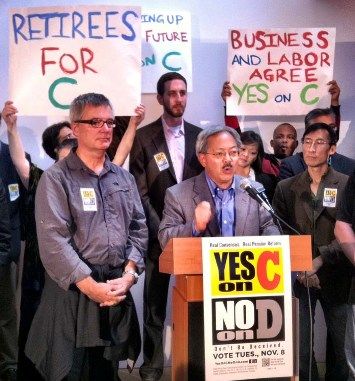Ruling on pension bonuses shows obstacles to CA reform
 Providing bonus checks to government retirees when pension funds have good years has long been common and controversial around California. Now an appellate court has ruled this policy is a vested benefit that can’t be ended by formal action of government officials or as part of a voter-approved pension reform measure.
Providing bonus checks to government retirees when pension funds have good years has long been common and controversial around California. Now an appellate court has ruled this policy is a vested benefit that can’t be ended by formal action of government officials or as part of a voter-approved pension reform measure.
It’s another sign of how daunting pension reform is in California. Ed Mendel of Calpensions.com has the details:
A retiree group won a big victory last month. Reversing a superior court ruling, an appeals court overturned part of a voter-approved San Francisco pension reform in 2011 that ended higher payments to retirees when investments have “excess earnings.” …
Retirees, scattered and no longer union members, might seem unlikely to be formidable, particularly when battling a cost-cutting pension reform backed by all 11 county supervisors, business and labor groups, and 69 percent of San Francisco voters in 2011.
The reform, Proposition C, was the milder establishment alternative to deeper pension cuts in Proposition D by Jeff Adachi, one of the 16 candidates for mayor on the San Francisco ballot that year, including the incumbent and winner, Mayor Ed Lee.
“The epitome of greed,” Gary Delagnes, president of the San Francisco Police Officers Association, told SF Weekly in 2012 when the retiree group began its legal challenge.
“Vested benefits” theory protects flawed concept
The court decision shows that judges take the concept of “vested benefits” very seriously. Unlike in the private sector, once a government union is promised benefits, those benefits can’t later be reduced. When this legal axiom is combined with the state Public Employment Relations Board’s hostility to ballot measures on pension issues, the difficulty that taxpayers face in trying to scale back government pensions looks extraordinary.
But the San Francisco case is particularly noteworthy because it involves the single category of pension benefit that actuaries, accountants and good-government advocates find most indefensible. Giving government pensioners extra money when pension funds have strong years only makes mathematical sense if the pensioners get less when pension funds have bad years. No local government in California has such a policy.
“Excess earnings” benefits are never seen at big pension agencies with strong staffs like CalSTRS or CalPERS; it’s understood that they’re just not sustainable in the long run.
But in cities like San Francisco, San Diego and Fresno, and counties like Alameda and Mendocino, the actuarial, common-sense arguments were overwhelmed by political clout and expedience.
Here’s a link to a study commissioned by the Schwarzenegger administration that outlined the many costly quirks in local governments’ pension policies. It was highly critical of “excess earnings” bonuses.
Chris Reed
Chris Reed is a regular contributor to Cal Watchdog. Reed is an editorial writer for U-T San Diego. Before joining the U-T in July 2005, he was the opinion-page columns editor and wrote the featured weekly Unspin column for The Orange County Register. Reed was on the national board of the Association of Opinion Page Editors from 2003-2005. From 2000 to 2005, Reed made more than 100 appearances as a featured news analyst on Los Angeles-area National Public Radio affiliate KPCC-FM. From 1990 to 1998, Reed was an editor, metro columnist and film critic at the Inland Valley Daily Bulletin in Ontario. Reed has a political science degree from the University of Hawaii (Hilo campus), where he edited the student newspaper, the Vulcan News, his senior year. He is on Twitter: @chrisreed99.
Related Articles
Unions or cities pushing more tax increases?
July 19, 2012 Katy Grimes: Not wanting to be left out of the latest trend, it appears that Sacramento’s City
Statewide seats surprisingly close
Aside from Gov. Jerry Brown’s victory, 58 to 42, which I wrote about earlier, the other statewide races are surprisingly close in
NFIB opposes four Sacramento bills
Here’s the analysis of four pieces of legislation in the California State Assembly and Senate by the National Federation of Independent Business California.




